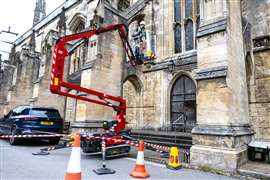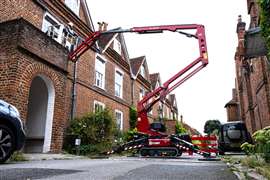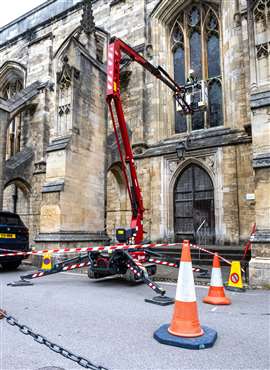Ancient cathedral overhaul for Hinowa spider
01 November 2024
A cathedral that dates back almost 1,000 years is being maintained with the help of a Himowa spider lift to see it thrive for centuries to come.
 The Hinowa spider at work at Winchester Cathedral duirng August this year.
The Hinowa spider at work at Winchester Cathedral duirng August this year.
Expert teams dedicated to conserving Winchester Cathedral, in Hampshire, UK, are using the Hinowa Lightlift 14.70 IIIS for multiple maintenance tasks inside and outside the ancient building.
The spider lift, supplied by Access Platform Sales, the UK and Ireland distributor for all Hinowa products, is also used to carry out maintenance work at height on 35 properties in and around the Cathedral Close.
Purchase of the Hinowa spider boom was made possible by a donation from the Friends of Winchester Cathedral, an independent charity that raises funds to support its upkeep.
Joe Meader, Head Carpenter and Works Manager at Winchester Cathedral, said, “We’re so grateful to the Friends for their assistance. Our Hinowa spider lift is vital to our maintenance programme. It allows us to complete a huge range of works in a timely, safe and cost-effective way.
“The cathedral is Grade I listed, and we maintain other Grade I and Grade II listed buildings, so having a spider lift to work from allows us to inspect and repair structures a minimum of physical intervention, which is very helpful.”
Versatile donation
Bruce Parker, Chairman of the Friends of Winchester Cathedral, said, “We have provided the cathedral with many pieces of useful equipment over the years but none so versatile as this latest tracked cherry picker.”
 Hinowa Lightlift 14.70 IIIS
Hinowa Lightlift 14.70 IIIS
APS Regional Sales Manager Jonathan Wiseman added, “To see the way this Hinowa platform plays such a pivotal role at cathedral as iconic and important as Winchester is truly impressive.
“The extra effort that would be needed, and the cost incurred, to achieve the same maintenance standards if it wasn’t available would be truly enormous.”
The Hinowa Lightlift 14.70 has a maximum working height of 13.9m and a maximum outreach of 6.76m, with a basket capacity of 120kg. It has an outreach of 5.92m with a basket capacity of 200kg.
At just 786mm wide, it can be tracked into the tightest of spaces. This is ideal for working in and around the cathedral, which has many nooks and crannies that could otherwise restrict platform access.
The new spider lift replaces a Hinowa Goldlift 14.70 spider lift the cathedral maintenance team had been using for around 20 years, reflecting the reliable service it had delivered, said Joe Meader.
Cathedral applications
The Lightlift 14.70 spider is kept busy all year by carpenters, painters, stone masons and arborists.
Over the summer it was used by the cathedral’s carpenters and painters and decorators who have replaced and painted wooden windows in a 17th Century house in Dome Alley just off the Cathedral Close.
In the autumn, it was handed over to the cathedral’s landscape maintenance teams to manage shrubbery and trees - some of them nearly as ancient as the cathedral buildings themselves.
 The Hinowa Lightlift 14.70 IIIS at Winchester Cathedral.
The Hinowa Lightlift 14.70 IIIS at Winchester Cathedral.
By working from the spider lift, the cathedral’s arborists can make sure any tasks, such as crown reduction, are done in the most sensitive way, preserving the trees’ long-term future.
Throughout the year, stone masons use the spider lift to inspect, clean and repair stone work and stained glass windows throughout the cathedral and in other buildings.
Lightlift specifications
The cathedral has selected a bi-energy version of the platform. It can be powered with by a low-emissions Honda petrol or by 110v mains cable electricity for indoor operations or where near-silent working is required, for example not to disturb activity in and around the cathedral.
The Lightlift 14.70 can also be supplied with a diesel engine and mains cable electric power, or as an all-electric powered platform with lithium batteries.
As a tracked MEWP, the platform can cope well with all surfaces and ground conditions across the cathedral estate, including working across low-load bearing and sensitive surfaces when combined with protective matting inside the cathedral.
Also, the tracks can be widened to 1150mm to improve the platform’s stability when it is being tracked over sloping or uneven ground.
A range of advanced safety features, including load and tilt sensors and alarms, and emergency lowering systems that can be accessed from the ground or in the basket, to optimise operative safety.
MAGAZINE
NEWSLETTER
CONNECT WITH THE TEAM






